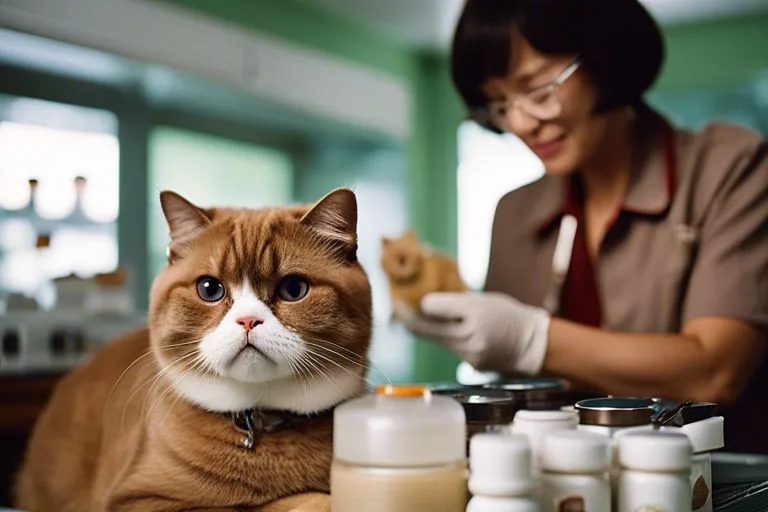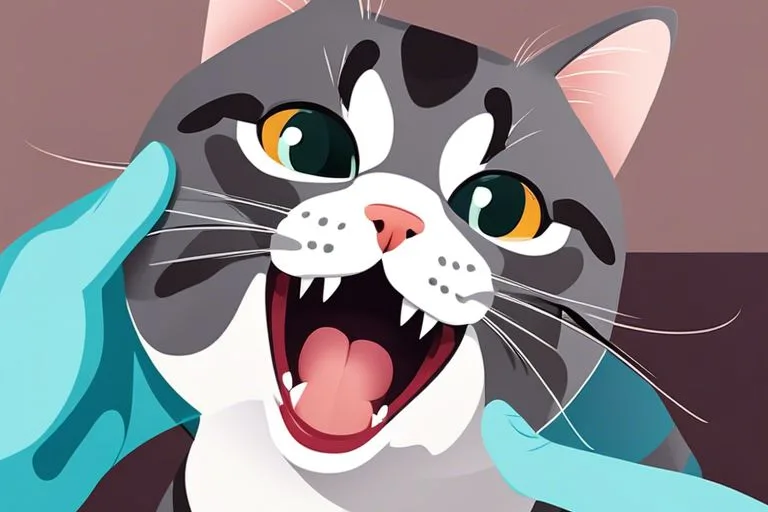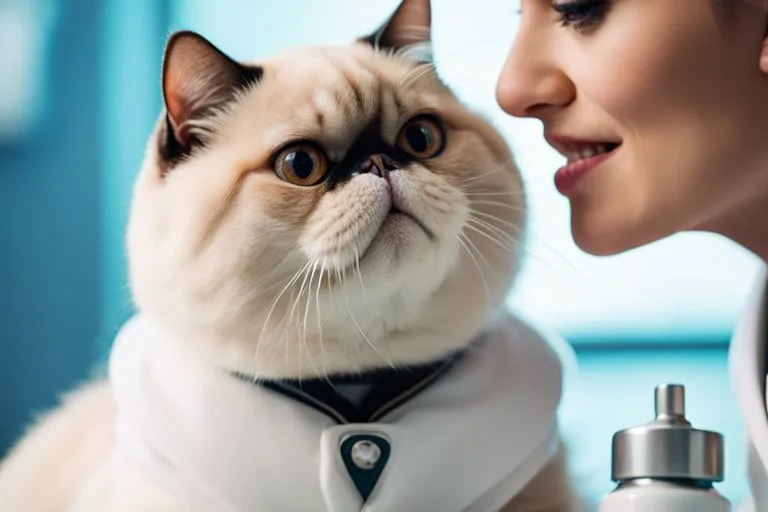Ensuring the health and well-being of our feline companions is a top priority for any responsible pet owner. When it comes to shorthair cats, understanding the key health tests that can help identify potential genetic or hereditary conditions is crucial. These tests not only provide valuable insight into a cat's overall health, but they also allow for early detection and intervention, ultimately leading to a longer and healthier life for our beloved pets.
Key Takeaways
- Genetic testing for shorthair cats allows for early detection and proactive management of inherited diseases and conditions.
- Disease-specific testing, such as PKD testing and HCM screening, is crucial for early detection and management of these conditions.
- Regular testing for FeLV and FIV helps ensure overall health and well-being, especially for outdoor or unknown cat-interacting shorthair cats.
- Testing for conditions like PRA and PK deficiency enables proactive measures for preserving the cat's vision and improving their quality of life.
Overview of Genetic Testing
Genetic testing plays a crucial role in the comprehensive healthcare of shorthair cats, providing valuable insights into potential inherited diseases and conditions that may affect their well-being. By analyzing a cat's DNA, genetic testing can identify genetic mutations associated with certain diseases, allowing for early detection and proactive management. This proactive approach enables veterinarians and cat owners to make informed decisions about the cat's healthcare, including preventive measures and tailored treatment plans.
Shorthair cats are susceptible to a variety of genetic diseases, such as hypertrophic cardiomyopathy, polycystic kidney disease, and certain types of cancer. Genetic testing can help identify these predispositions, enabling early intervention and potentially extending the cat's lifespan. Furthermore, genetic testing can assist breeders in making informed decisions to reduce the prevalence of hereditary diseases within shorthair cat populations.
In addition to disease predisposition, genetic testing can also provide insights into a cat's ancestry and lineage. This information can be valuable for breeders, allowing them to maintain and improve the breed's genetic diversity and overall health. Overall, genetic testing is an invaluable tool for managing the health and well-being of shorthair cats, offering a proactive approach to healthcare and breeding practices.
Polycystic Kidney Disease (PKD) Testing
Polycystic Kidney Disease (PKD) testing is a vital component of comprehensive healthcare for shorthair cats, aiding in the early detection and management of this inherited condition. PKD is a genetic disorder characterized by the development of fluid-filled cysts in the kidneys, which can lead to kidney failure if left untreated. Testing for PKD involves genetic screening to identify the presence of the PKD1 gene mutation, which is responsible for the development of the disease. Early detection through genetic testing allows for proactive management strategies to be implemented, such as dietary modifications and regular monitoring, which can help slow the progression of the disease and improve the cat's quality of life.
PKD testing is particularly important for breeding cats, as it enables responsible breeding practices by identifying carriers of the PKD gene. This helps to prevent the transmission of the disease to offspring, ultimately contributing to the overall health and welfare of the feline population. Additionally, for pet shorthair cats, PKD testing can provide valuable insight for proactive healthcare planning, ensuring early intervention if the disease is detected. Overall, PKD testing plays a crucial role in safeguarding the health of shorthair cats and preventing the potential impact of this hereditary condition.
Hypertrophic Cardiomyopathy (HCM) Screening
Hypertrophic Cardiomyopathy (HCM) screening is another essential aspect of comprehensive healthcare for shorthair cats, contributing to the early detection and management of this cardiac condition. HCM is a common genetic heart disease in cats, particularly prevalent in certain breeds, including shorthair cats. Regular screening for HCM is crucial for identifying the condition in its early stages, allowing for prompt intervention and management. The screening process typically involves a thorough physical examination by a veterinarian, including listening for abnormal heart sounds and evaluating for signs of heart failure. Additionally, advanced diagnostic tools such as echocardiography, electrocardiography, and blood tests may be employed to assess the cat's cardiac health comprehensively. Early detection of HCM enables timely initiation of treatment, which can significantly improve the cat's quality of life and life expectancy. Furthermore, as HCM can be asymptomatic in its early stages, proactive screening is vital for identifying affected cats before the disease progresses to a more advanced and potentially life-threatening stage. Therefore, regular HCM screening is paramount for ensuring the overall health and well-being of shorthair cats.
Feline Leukemia Virus (FeLV) and Feline Immunodeficiency Virus (FIV) Testing
Regular testing for Feline Leukemia Virus (FeLV) and Feline Immunodeficiency Virus (FIV) is crucial for ensuring the overall health and well-being of shorthair cats. FeLV and FIV are potentially life-threatening viruses that can weaken a cat's immune system, making them more susceptible to other illnesses. FeLV is primarily transmitted through close contact with an infected cat, while FIV is commonly spread through bite wounds. Both viruses can be present in a cat without showing any immediate symptoms, making regular testing essential for early detection and treatment.
Veterinarians recommend testing all shorthair cats for FeLV and FIV, especially if they spend time outdoors or have been in contact with other cats of unknown health status. Testing typically involves a simple blood test, and results can be available within a short period. If a cat tests positive for either virus, the veterinarian can work with the pet owner to develop a management plan to ensure the cat's quality of life and reduce the risk of transmitting the virus to other cats. Testing for FeLV and FIV is a proactive step in safeguarding the health of shorthair cats and promoting responsible pet ownership.
Hemophilia and Blood Clotting Disorders Screening
Screening for hemophilia and blood clotting disorders is a crucial aspect of maintaining the overall health and well-being of shorthair cats, particularly those with a genetic predisposition to these conditions. Hemophilia, a hereditary bleeding disorder, can lead to excessive bleeding even from minor injuries. Similarly, blood clotting disorders can pose serious health risks for shorthair cats, affecting their ability to heal from wounds and surgeries. To screen for these conditions, veterinarians typically conduct blood tests to assess the cat's clotting function and to identify any abnormalities in clotting factors. Early detection of hemophilia and blood clotting disorders is essential for effective management and treatment. Treatment options may include medication to promote clotting, and in severe cases, blood transfusions may be necessary. Additionally, preventive measures such as avoiding activities that could lead to injuries and prompt attention to any wounds are crucial for cats with these conditions. Regular screening for hemophilia and blood clotting disorders is essential in providing the best possible care for shorthair cats predisposed to these conditions.
Progressive Retinal Atrophy (PRA) Test
Given the importance of genetic predispositions and health screenings for shorthair cats, the discussion will now focus on the Progressive Retinal Atrophy (PRA) Test, a vital assessment for maintaining their overall well-being. Progressive Retinal Atrophy (PRA) is a group of genetic diseases that cause the degeneration of the retina, eventually leading to blindness. This condition is particularly prevalent in certain shorthair cat breeds. The PRA test is a genetic screening tool that helps identify the presence of mutations associated with PRA, allowing for early detection and management of the condition.
The PRA test is typically conducted through a simple blood sample or a cheek swab, which is then analyzed to detect specific genetic mutations linked to PRA. Early identification of these mutations can enable proactive measures to preserve the cat's vision and manage the progression of the disease. As with any genetic test, it is crucial to consult with a veterinarian or a feline genetics specialist to understand the implications of the test results and to develop a suitable care plan. Routine PRA testing for shorthair cats can aid in preventing or minimizing the impact of this degenerative eye disease, thus contributing to the cat's overall quality of life.
Pyruvate Kinase Deficiency (PK Deficiency) Testing
Pyruvate Kinase Deficiency (PK Deficiency) Testing plays a crucial role in identifying a genetic condition that can affect the health of shorthair cats. PK deficiency is an inherited disorder that affects the cat's red blood cells, leading to anemia and other associated health issues. The test for PK deficiency involves genetic screening to identify the presence of specific mutations associated with the condition. It is particularly important for shorthair cats, as certain breeds, such as Abyssinians and Somali cats, are predisposed to this genetic anomaly.
Early detection through PK deficiency testing allows for proactive management of the condition, which can significantly improve the cat's quality of life. Cats identified as carriers can be selectively bred to prevent the spread of the mutation within the breed. Moreover, affected cats can receive timely medical interventions to alleviate the symptoms and prevent complications associated with anemia.
PK deficiency testing is highly recommended for all shorthair cats, especially those belonging to breeds with a known predisposition to the condition. By identifying carriers and affected individuals, this test plays a pivotal role in maintaining the overall health and well-being of shorthair cats.
Frequently Asked Questions
What Are the Common Signs and Symptoms of Health Issues in Shorthair Cats That May Warrant Genetic Testing?
Common signs of health issues in shorthair cats include excessive grooming, weight loss, and changes in behavior. Genetic testing can help identify predispositions to diseases such as hypertrophic cardiomyopathy, polycystic kidney disease, and diabetes. Regular testing is crucial.
Are There Any Specific Environmental Factors That Can Increase the Risk of Developing Genetic Health Conditions in Shorthair Cats?
Environmental factors such as exposure to secondhand smoke, household chemicals, and poor diet can increase the risk of genetic health conditions in shorthair cats. Understanding these factors can aid in preventing and managing potential health issues.
How Often Should Shorthair Cats Be Tested for Feline Leukemia Virus and Feline Immunodeficiency Virus, and What Are the Recommended Prevention Methods?
Shorthair cats should be tested for feline leukemia virus and feline immunodeficiency virus annually, or as recommended by a veterinarian. Prevention methods include vaccination and avoiding exposure to infected cats. Regular testing is crucial for early detection and management.
Are There Any Alternative or Complementary Screening Methods for Detecting Hemophilia and Blood Clotting Disorders in Shorthair Cats?
Alternative screening methods for detecting hemophilia and blood clotting disorders in shorthair cats may include genetic testing for specific mutations associated with these conditions. Consult with a veterinarian to discuss the most effective and appropriate testing options for your cat.
What Are the Potential Treatment Options for Shorthair Cats Diagnosed With Progressive Retinal Atrophy or Pyruvate Kinase Deficiency?
Potential treatment options for shorthair cats diagnosed with progressive retinal atrophy may include supportive care, dietary adjustments, and specialized medications. For pyruvate kinase deficiency, treatment may involve blood transfusions, supportive care, and management of associated symptoms.
Conclusion
In conclusion, regular health testing for shorthair cats is essential for early detection and management of potential genetic disorders. These tests can help ensure the well-being and longevity of your feline companion. By staying proactive and informed about your cat's health, you can provide them with the best possible care and support. Remember, your cat's health is priceless, so investing in these tests is truly a small price to pay for their overall well-being.




